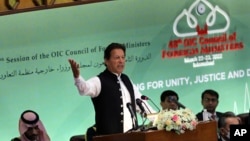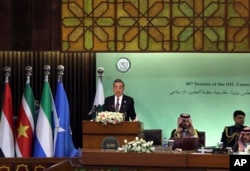Pakistan’s Prime Minister Imran Khan advocated on Tuesday for Muslim countries and close ally China to work together to mediate and put an end to the Russia-Ukraine conflict.
“We are all worried about what’s going on there,” Khan told the opening session of a two-day conference of foreign ministers from the 57-nation Organization of Islamic Cooperation (OIC) being hosted in Islamabad, the Pakistani capital.
“We should think about …how we can mediate, how we can bring about a cease-fire,” Khan said in his keynote speech to the inaugural session of the 48th session of the OIC Council of Foreign Ministers.
“May be OIC along with China, we can all step in and try to stop this conflict, which is going to have, if it keeps going the way it is, it would have great consequences for the rest of the world,” Khan said.
Chinese Foreign Minister Wang Yi attended and addressed the OIC meeting as a special guest. U.S. and envoys from other non-OIC countries as well as the United Nations are among around 600 delegates also attending the conference.
China and Pakistan have not condemned Russia’s invasion of Ukraine.
Wang met with Pakistani Foreign Minister Shah Mehmood Qureshi after arriving in Islamabad on Monday for the OIC meeting. “The two sides “exchanged views on the Ukraine issue and expressed concerns over the spillover effects of unilateral sanctions” against Moscow, according to a post-meeting statement from the Chinese foreign ministry. Beijing has denounced the Western sanctions as getting “more and more outrageous.”
Khan met with President Vladimir Putin in Moscow on February 24 -- the day tens of thousands of Russian forces invaded Ukraine. Pakistan also abstained from the U.N. General Assembly vote that condemned the Russian aggression.
The Pakistani prime minister has also publicly and repeatedly criticized Western diplomats in Islamabad for collectively urging his government in a letter recently to condemn Moscow for its action against Kyiv, saying Pakistan wants to stay neutral and would rather help in any efforts to promote a negotiated settlement between the warring sides.
Pakistan has lately developed close ties with Ukraine, becoming a major importer of Ukrainian wheat while relations between the South Asia nation and Russia have also rapidly improved in recent years after decades of adversarial ties because of Islamabad’s alliance with the West during the Cold War.
Afghanistan
Khan also renewed his call for stepping up support for Afghanistan, where humanitarian and economic upheavals have worsened since the Taliban takeover of the country last August.
“Finally, there is no conflict going on (there). The only danger now to Afghanistan is that through the sanctions and non-recognition, they might end up having a humanitarian crisis,” the Pakistani leader said.
Khan said already people in the neighboring country are falling below the poverty line and there’s brain drain going on.
“So, it’s extremely important that we help the people of Afghanistan. And I say this because a stable Afghanistan is the only way we are going to be able to stop international terrorism from Afghan soil,” he added.
“Let’s not be delusional that some other country will come and, sort of through drones or something, fight terrorism. It’s not going to happen.”
No country has yet recognized the Taliban as the legitimate rulers of Afghanistan, citing concerns related to human rights, terrorism and a lack of inclusive government in Kabul since the hardline group seized power.





